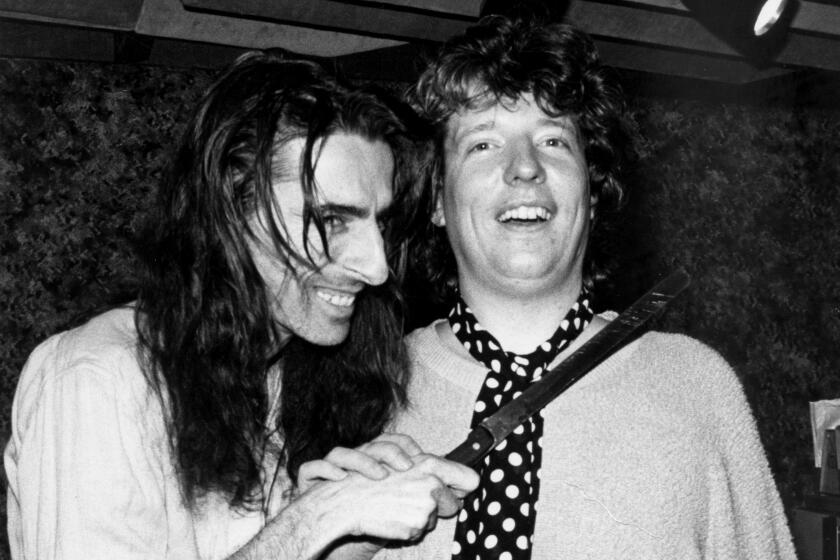‘Spud’ Murphy, 96; Prolific Composer, Arranger Was Well-Known as Teacher
- Share via
Lyle “Spud” Murphy, the composer, arranger, bandleader and teacher who created music for acts as varied as the Three Stooges and bandleader Benny Goodman, but was perhaps best known for a system for composing that is widely used by professional musicians, has died. He was 96.
Murphy died Aug. 5 at Hollywood Presbyterian Hospital of complications from recent surgery, colleagues told The Times.
Murphy’s resume was varied as well as accomplished. He arranged two of Goodman’s greatest hits, “Get Happy” and “Jingle Bells,” and took the children’s ditty “Three Blind Mice” and turned it into the theme for the Three Stooges shows.
He wrote hundreds of instrumental compositions, contributed music to more than 50 films, wrote dance arrangements for several Fred Astaire movies, led a conventional swing orchestra and made several jazz recordings under his own name.
In his 90s, far from fading into retirement, Murphy kept active spreading his method of composing, arranging and orchestration, which he began teaching in his 40s.
Born in Berlin, Murphy moved to the United States at age 4 with his mother and grew up in Provo, Utah. He showed an early natural talent for music and first learned upright e-flat alto horn taking lessons from the father of famed trumpet player Red Nichols. Murphy would eventually master the trumpet and all the saxophones and other woodwinds.
He left home at 14 and got his first music job at 16, playing and arranging music for Johnny McFall and his Dallas-based band, the Honey Boys. Murphy played and arranged music for a number of bands over the next several years before landing in New York City in 1933.
He became well-known in New York’s busy music world creating arrangements for bandleaders, including more than 100 for Goodman’s “Let’s Dance” radio broadcast and scores for Glen Gray and the Casa Loma Orchestra.
He also created more than 250 stock arrangements for several leading music publishers, many of which are still used by dance bands worldwide.
According to colleagues, Murphy’s schedule for the week went something like this: Monday through Thursday, one chart per day for Goodman; Friday, two charts for Gray; Saturday; two stock arrangements. He took Sunday off. It was a demanding pace.
While in New York, he also formed an orchestra, made several radio broadcasts and recorded five albums for Decca and Bluebird.
Murphy moved to California in the late 1930s and started writing charts for Columbia Pictures, but left that work to serve in the merchant marine in World War II.
After the war, he picked up film work. It was during this time that he arranged “Three Blind Mice” for the Stooges’ movies.
By the late 1940s, arrangers had become fascinated with the prolific Murphy’s writing technique. One fledgling composer persuaded Murphy to teach him through the G.I. Bill. Murphy would go on to train hundreds of students, including top jazz names such as Oscar Peterson, Buddy Collette and Gerald Wiggins.
Murphy called his composing and arranging process the Equal Interval System.
David Blumberg, an arranger/composer who contributed arrangements for the Grammy-winning Ray Charles album “Genius Loves Company” and the “American Idol” TV show, said Murphy’s method was “a simple way to deal with 12 notes by using six intervals. And that use of six intervals, when mastered, would allow anyone to write any style or type of music freely.”
“One of his favorite quotes was, ‘To write today’s music, you can’t use yesterday’s methods,’ ” said Blumberg, who teaches courses on Murphy’s method.
Blumberg said the method was “an encyclopedia of musical tools that you can use all your life.”
“He kept evolving the text over a 50-year period,” Blumberg said. “The course includes not only examples of his work, but the work of his students, which has kept it fresh.” Kennard Ramsey, who scores for film and television and studied with Murphy for five years, said the Equal Interval System “took a lot of the mystery and misinformation out of traditional music studies. He made it so simple to see.”
“Spud was such a wealth of knowledge; you could always go back to him for help,” Ramsey said. “He would just know what to do. He was vital up until the end.” Murphy’s system also allows its users to work quickly -- an important factor in working in Hollywood.
“In this town, in order to make a living, speed is of the essence,” composer Tom Griep, a one-time student, told The Times a few years ago. “You learn under him to write faster, more adventurously.”
Murphy won numerous awards in his industry and was a charter member of the American Society of Music Arrangers and Composers, serving 12 years as its president. He also served on the board of directors of Professional Musicians Union Local 47 for more than 25 years.
Several colleagues used the term Renaissance man in describing Murphy. He spoke several languages, was a voracious reader who kept up with current events, and was a keen student of boxing. He also was an expert in astronomy, geography and the Titanic.
Murphy is survived by his daughters Lilith and Jolie and two grandchildren. A memorial service will be held at 7 p.m. Aug. 22 at Forest Lawn, Glendale. More information on his course can be found at www.equalinterval.com.
More to Read
The biggest entertainment stories
Get our big stories about Hollywood, film, television, music, arts, culture and more right in your inbox as soon as they publish.
You may occasionally receive promotional content from the Los Angeles Times.









